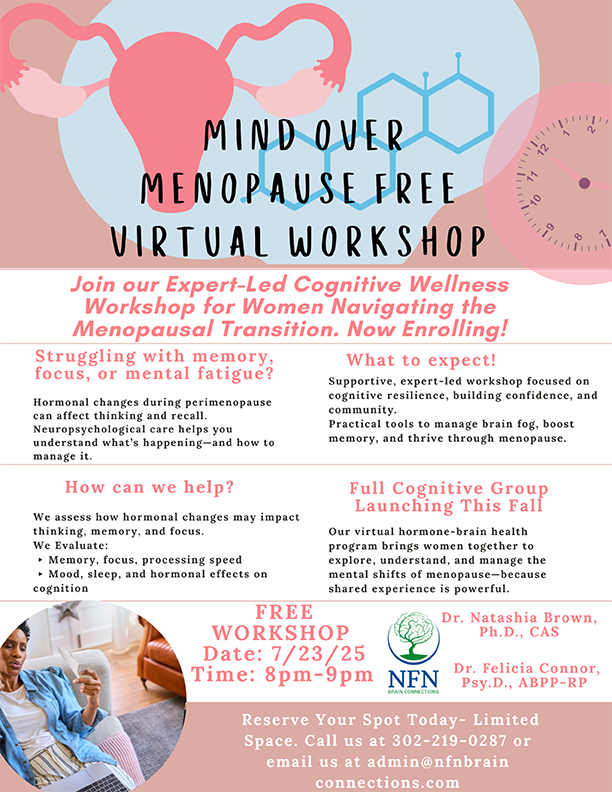
Menopause & Cognitive and Emotional Health
Supporting Women Through a Time of Transition
Menopause and perimenopause can bring more than just physical symptoms—they can affect your memory, mood, and focus, too. At NFN Brain Connections, we offer testing and guidance to help you better understand what’s happening and how to feel more like yourself again.
How Menopause Affects Your Brain
Many women report feeling "off" during perimenopause/menopause but aren’t sure why. Hormonal shifts, especially a decrease in estrogen, can affect brain function in surprising ways.
Common Cognitive Symptoms
- Memory problems or forgetfulness
- Trouble concentrating or staying focused
- Word-finding difficulties
- Feeling mentally foggy or slowed down
- Difficulty staying organized or multitasking
- Increased anxiety or mood swings
You're not imagining it, over 40% of women in perimenopause report cognitive changes. Even subtle symptoms can affect your confidence, work, and relationships.
Neuropsychological Testing for Cognitive Changes
At NFN, we offer brief and comprehensive neuropsychological assessments to understand how menopause or perimenopause may be impacting your thinking and emotional well-being.
Our Evaluations Include:
- Verbal Memory & Learning: How well you recall and retain new information
- Executive Functioning: Planning, problem-solving, and mental flexibility
- Attention & Processing Speed: Focus and speed of thinking
- Emotional Wellbeing: Depression, anxiety, and stress responses
Your personalized results will guide tailored recommendations and provide clarity on how to improve your daily functioning.
Group Support & Shared Experience
You’re not alone. Many women find healing in connection. We offer small-group support sessions where you can:
- Share your experience with others going through similar transitions
- Learn practical strategies for memory, focus, and mood
- Build resilience and reduce stigma
Our groups are warm, supportive, and empowering.
Why Now Is the Right Time
Perimenopause is a window of vulnerability, but also a time of opportunity. Symptoms often begin earlier than expected, even in your late 30s or early 40s. Early assessment and coaching groups can lead to more effective support and improved quality of life.


